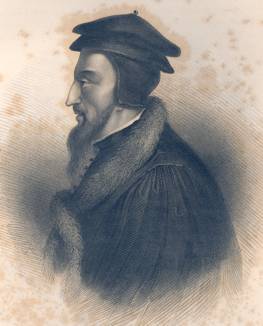John
Calvin

John
Calvin | John
Calvin (the Latinized form of his birth name, Jean Cauvin) studied for the priesthood
at Paris in his youth, then turned his attentions to civil and canon law in Orleans.
Exposed to the ideas of Martin Luther while he was still in Paris, Calvin had
definitely moved into Luther's Protestant camp by 1533. On November 1 of that
year, he delivered a speech in which he attacked the established church and called
for reforms. He started a revolt against the Catholic Church's medieval condemnation
of "usury" -- basically offering loans to be paid back with interest.
(This doesn't seem like a religious argument, but most major churches banned usery
at the time.) Calvin was offering a poor man an opportunity to work his way out
of his then-hopeless condition, and the caste system. This idea would set the
stage for the development of capitalism in northern Europe. Other ideas weren't
as popular, such as the doctrine of predestination, which states that God has
not only appointed the eternal destiny of some to salvation (Unconditional election),
but also appointed the remainder to eternal damnation (Reprobation).
Rather
than bringing about the reforms he sought, Calvin's ideas elicited a wave of anti-Protestant
outrage that forced him to flee. He ended up in Geneva, where in 1541, pro-Protestant
forces gained control of the city. Geneva that became a point of refuge for persecuted
Protestants from all over the world, and Calvin became the dominant figure there,
as he created a new church. The process was brutal: Calvin had the Catholic opposition
suppressed, punished and sometimes executed as he forced his ideas on the population
of Geneva. "Freiheit" at this time wasn't so much the freedom
to break free from an oppressor as it was the freedom to choose to be oppressed
by someone else. |
